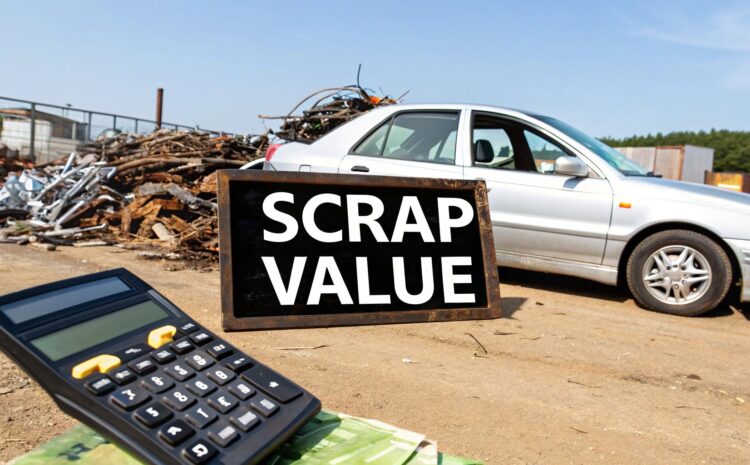
How to Calculate Scrap Value of Car | Easy UK Guide
So, you're looking to figure out what your old car is worth as scrap? It’s less complicated than you might think. At its core, the calculation boils down to this: (Your Car's Weight) x (The Going Rate for Scrap Metal) – (A Bit for Non-Metal Bits). This simple formula is what scrap yards use, and it'll give you a solid ballpark figure.
What Really Sets Your Car's Scrap Value
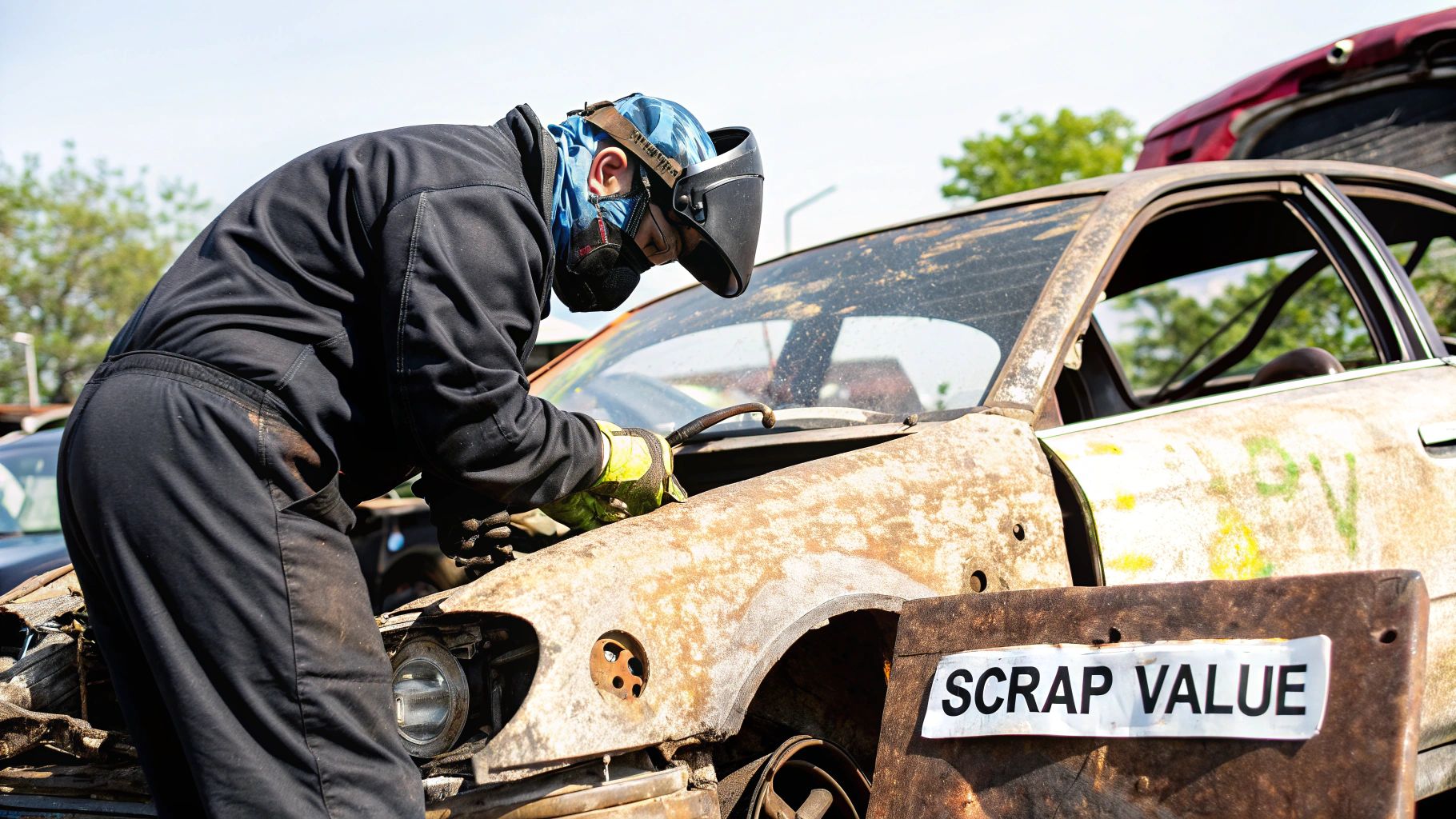
Before you start hunting for quotes, it helps to understand what's actually driving the price. It’s not just one number; the final offer is a mix of your car's physical stats and the state of global commodity markets. Getting your head around these elements puts you in a much better position to know a good deal when you see one.
The biggest piece of the puzzle is your car's kerb weight. It's simple, really: heavier cars mean more metal. That metal—mostly steel, but also valuable aluminium and copper—is the raw material the scrap yard is buying.
The Nuts and Bolts of Valuation
Of course, weight is just the beginning. The price you're offered is also tied to the constantly shifting price of scrap metal. These rates can change daily, influenced by everything from industrial demand in other countries to new trade rules.
Let's break down what truly matters.
Key Factors Influencing Your Car's Scrap Value
The table below summarises the primary elements that a scrap yard considers when putting together a valuation for an end-of-life vehicle. It's a blend of your car's physical attributes and external market forces.
| Factor | Impact on Value | Example |
|---|---|---|
| Vehicle Weight | This is the most significant factor. More weight equals more recyclable metal. | A hefty Land Rover will naturally fetch a higher price than a lightweight Ford Fiesta. |
| Current Metal Rates | Prices for steel, aluminium, and copper fluctuate daily based on global supply and demand. | A surge in construction could drive up steel prices, increasing the value of all scrap cars. |
| Make and Model | A minor factor, but some models have reusable parts in high demand, adding a small premium. | Specific gearboxes or catalytic converters from certain models might be sought after by mechanics. |
| Deductions | The cost of removing and disposing of non-metal parts (plastic, glass, fluids) is subtracted. | A car with a stripped interior might have fewer deductions than a fully intact vehicle. |
Understanding these components demystifies the quote you receive, showing you that it's based on tangible, real-world metrics rather than just an arbitrary figure.
It's also worth noting that some parts might have more value than you'd expect. To get a better feel for this, you can learn more about how much scrappage your car is worth in our comprehensive guide.
I've seen it time and again: people assume their premium BMW will be worth far more than a Ford of the same size. But unless it has specific parts that are in high demand for salvage, the value is almost entirely down to its weight in metal.
What to Expect From the Market
What does this mean in pounds and pence? Based on current market trends for 2025, most UK drivers can expect an offer somewhere in the region of £200 to £500. This range is almost entirely dictated by the car's weight and the strong ongoing demand for recycled steel worldwide.
Figuring Out Your Car's Official Kerb Weight
So, you want to get an accurate scrap value for your car? It all boils down to one key number: its kerb weight. This is the official weight of your car as it came from the factory—with a full tank of fuel and all the necessary fluids, but no passengers or luggage. It’s this figure that tells the scrap yard, or Authorised Treatment Facility (ATF), exactly how much metal they're buying.
A lot of people just guess the weight, but that's a surefire way to get a disappointing quote. Thankfully, you don't need to guess. Finding the real number is pretty simple.
Where to Find the Kerb Weight
Your best bet is the V5C logbook, which is your car's registration document. The kerb weight is listed right there, and it’s the number that scrap yards will always trust.
Can't put your hands on the V5C? No problem. The next place to look is the owner's manual that came with the car. Flip to the technical specs section, and you should find it listed as "unladen weight" or "kerb weight."
This image shows you where to look for the "Mass in service" on a UK V5C—that’s the official term for kerb weight.
This figure, almost always in kilograms (kg), is what you need. Using the official weight from your V5C means your first quote will be based on hard facts, not a vague estimate.
I always tell people to find this number before they even think about getting quotes. It avoids arguments later and starts the whole process off on the right foot. A five-minute search can save you a world of trouble.
If both your V5C and the manual have gone missing, you can turn to the internet. There are plenty of online databases where you can look up your car’s details just by typing in the registration number. Just make sure you're using a reputable UK site to get the correct specs for your model. Getting this weight right is the first, and most important, step to getting a fair price.
How Global Markets Affect Scrap Metal Prices
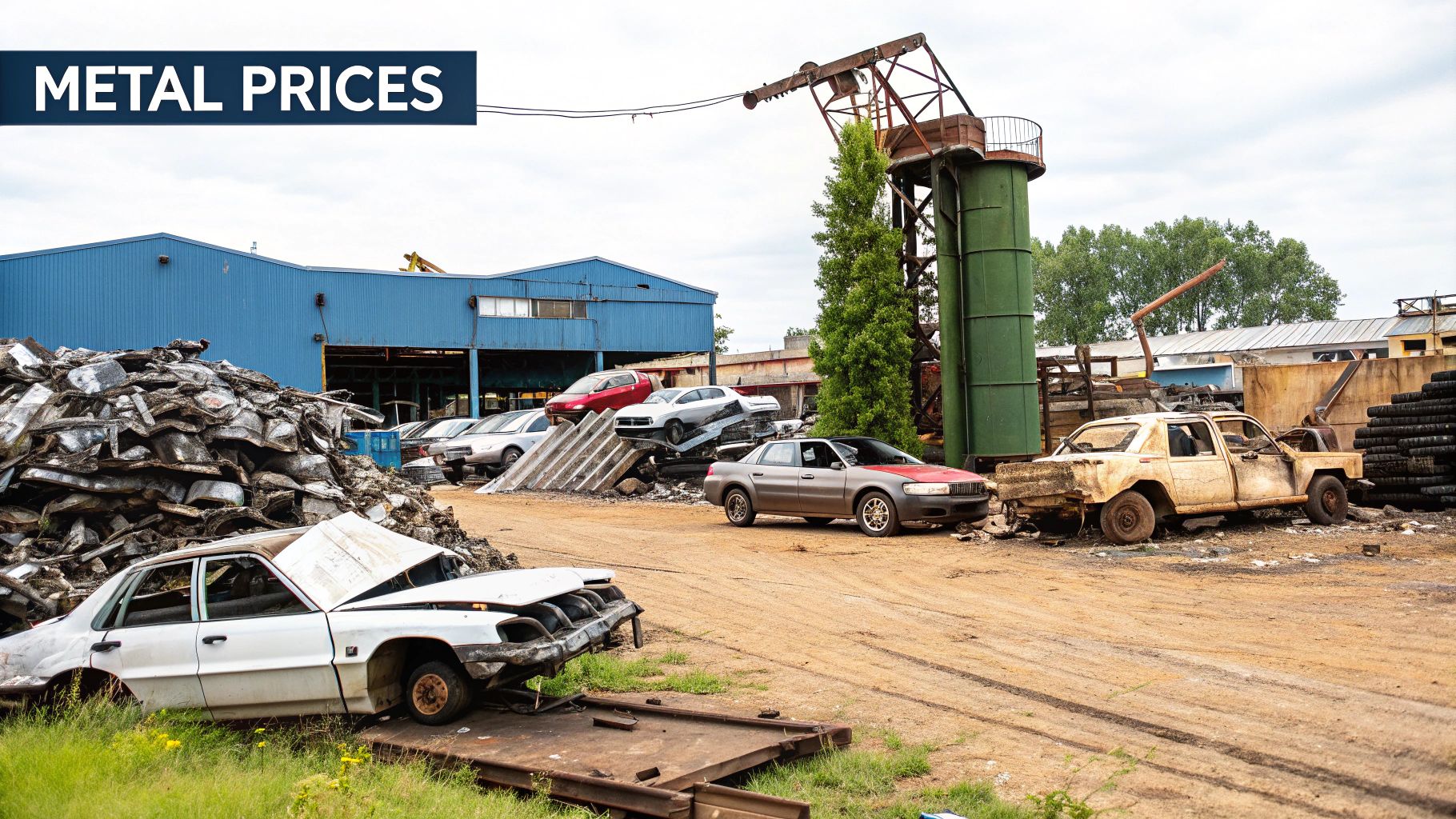
The price you’re offered for your old car isn't just decided down the road at your local scrapyard. It’s directly linked to the massive, ever-shifting global commodities market. When you calculate scrap value of car, you're really looking at a price influenced by supply chains and industrial demand thousands of miles away. This explains why a quote can change from one week to the next.
For example, a construction boom in Asia can send the demand for steel soaring. That pushes prices up everywhere, including right here in the UK. On the flip side, if a major car-producing nation scales back its manufacturing, its need for recycled metal falls, and prices tumble along with it.
International trade policies are another huge factor. A new tariff or trade agreement between global superpowers can alter the value of the metals in your car almost overnight. It's a complex, interconnected system.
Recent UK Market Trends
Here in the UK, we've certainly felt these shifts. Over the past couple of years, scrap metal prices have been on a bit of a rollercoaster, mostly trending downwards. This has a direct knock-on effect on what your old car is worth.
In April 2025, for instance, prices dropped by about £10 per tonne. This pulled the average scrap car payment down to a range of £230 to £260. That’s a significant dip from the highs of over £340 we saw just two years ago. One of the main culprits for this change was a new set of import tariffs from the United States, a key destination for UK scrap metal. You can get the full story on the April 2025 price drop and what caused it.
Realising that your car's scrap value is tied to global economics can be an eye-opener. It explains the volatility and reassures you that the price isn't arbitrary—it's based on real-time market forces.
Finding Reliable Price Information
So, where does that leave you? While you can’t predict where the market is headed, you can stay informed about where it is right now. Reputable industry websites often publish price indexes for scrap metal, giving you a solid benchmark.
A quick search for "UK scrap metal prices per tonne" will give you a good feel for the current climate. Armed with that knowledge, you're in a much better position to recognise a fair offer that reflects the true market conditions of the day.
Factoring in Deductions and Additions
Getting a figure based on your car’s weight and the day's metal prices gives you a solid ballpark estimate. But it’s crucial to remember that this isn't the final price you’ll be offered. Any reputable Authorised Treatment Facility (ATF) has to account for everything on the vehicle that isn't valuable scrap metal. This is where deductions come into play, and they’re a standard part of the process.
Think of it from the scrap yard's perspective. They're buying the metal in your car, but they also inherit the responsibility of disposing of everything else. Components like tyres, glass, plastic trim, and all the interior fabrics have zero metal value. In fact, it costs the yard money to have these materials processed and recycled correctly, so they'll subtract that cost from your initial quote.
It's also why you should always clear your car out. If it's full of old takeaway boxes or other rubbish, the yard will simply deduct the cost of disposal from your payment.
Major Parts That Impact Your Quote
The biggest price drops happen when high-value, metal-heavy components have been removed before the car gets to the yard. These parts either contribute significantly to the vehicle's weight or have a high resale value themselves.
You can expect a lower offer if key parts are missing:
- Engine or Gearbox: These are the heaviest single components, packed with steel and aluminium. Their absence makes a massive difference to the weigh-in.
- Catalytic Converter: This is a big one. Catalytic converters contain precious metals like platinum, rhodium, and palladium, making them one of the most valuable parts for a scrap yard.
- Alloy Wheels: If you’ve swapped the original alloys for a basic set of steel wheels, the yard will adjust the price. Aluminium alloy is worth more than steel.
I once dealt with a seller who was stunned by his low quote. It turned out he'd already cut off the catalytic converter and sold it online, not realising he’d just sold the most valuable single item on the car from a scrap perspective.
Before you get your final offer, it's worth understanding what a scrap yard might deduct for. Here’s a quick breakdown of common items and why they affect the price.
Common Deductions from Scrap Value
| Item/Condition | Reason for Deduction | Potential Value Impact |
|---|---|---|
| Missing Catalytic Converter | Contains precious metals; its absence is a significant value loss. | High |
| Missing Engine/Gearbox | Major loss of scrap metal weight (steel and aluminium). | High |
| Tyres Left On | Cost of environmentally-friendly disposal for the scrap yard. | Low to Medium |
| Alloy Wheels Swapped for Steel | Loss of higher-value aluminium. | Medium |
| Excessive Rubbish Inside | Yard has to pay for waste disposal. | Low to Medium |
| Fire or Flood Damage | Can damage valuable parts and makes processing more difficult. | Varies |
| Major Parts Stripped | Removal of alternators, radiators, batteries, etc., reduces overall weight. | Varies |
Ultimately, a complete car will always fetch the best price. Removing parts yourself rarely works out to be more profitable once you factor in the hassle and the reduced scrap offer.
Can Anything Increase the Value?
It's rare, but sometimes, certain parts can add a small bonus to your quote. This usually only happens with very popular models—think Ford Focus or Vauxhall Corsa—where demand for used parts is high. If your end-of-life vehicle has a particularly desirable engine or gearbox that’s known to be in good working order, a yard might offer a little extra.
However, this is definitely the exception, not the rule. The scrap valuation is overwhelmingly based on the car's weight, minus the necessary deductions. For a more detailed look at what your specific vehicle might be worth, you might be interested in our guide that explores how much you can get when you scrap your car.
Let's Calculate a Car's Scrap Value: A Real-World Example
Theory is one thing, but let's get our hands dirty and see how this all works in practice. To really understand how to calculate the scrap value of your car, we'll walk through a realistic scenario using a very common vehicle on UK roads: a 2008 Ford Focus. This way, you can see exactly how the numbers add up.
First things first, we need to know the car's weight. The official kerb weight is what scrap dealers use as a starting point. You can usually find this on the V5C logbook, but a quick online search works too. For our 2008 Ford Focus 1.6 Style 5-door, the kerb weight is 1,259 kg.
Since scrap metal is priced per tonne, we need to convert this. It's a simple bit of maths:
- Vehicle Weight: 1,259 kg ÷ 1,000 = 1.259 tonnes
Applying the Current Scrap Rate
Now we bring in the money. Let's say the going rate for scrap metal today is £180 per tonne. To get our initial, baseline figure, we just multiply the car's weight in tonnes by the current rate.
- 1.259 tonnes x £180/tonne = £226.62
This is the raw metal value of the car, as you can see in the steps outlined below.
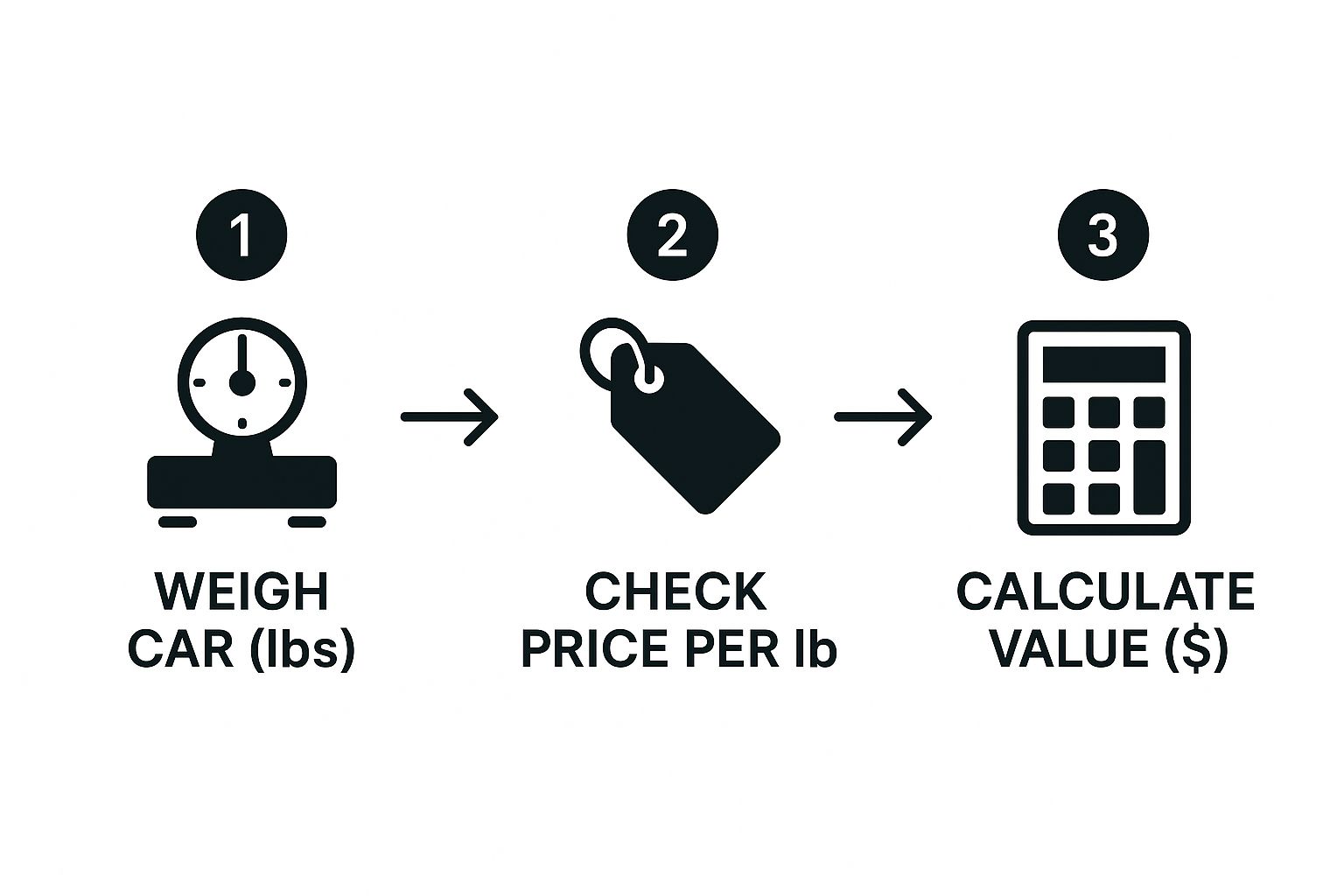
But hold on, that's not the final quote you'll get. We need to factor in the real-world costs that a scrap yard has to deal with.
Accounting for Deductions
That initial figure of £226.62 is the gross value. Think of it as the car's total worth in metal alone. A scrap yard won't pay this exact amount because they have costs to cover for handling all the non-metal parts.
Every car contains materials that can't be recycled as scrap metal—things like tyres, fluids, glass, and all the plastic trim. The Authorised Treatment Facility (ATF) has to pay to have these materials properly removed and disposed of, and they'll deduct that cost from your quote.
For a family car like a Focus, a typical deduction might be around 10-15% of the gross value. Let's use a 12% deduction for our example:
- First, calculate the deduction amount: £226.62 x 0.12 = £27.19
- Then, subtract it from the gross value: £226.62 – £27.19 = £199.43
That final figure of £199.43 is a much more realistic estimate of what you could expect to be paid.
This lines up pretty well with industry data. For instance, the average scrap value in Q1 2025 was £227, and popular models like the Ford Focus consistently fetch solid prices.
If you're keen to squeeze every last penny out of your old motor, take a look at our guide on how to scrap your car for the best value.
Common Questions About Scrapping Your Car
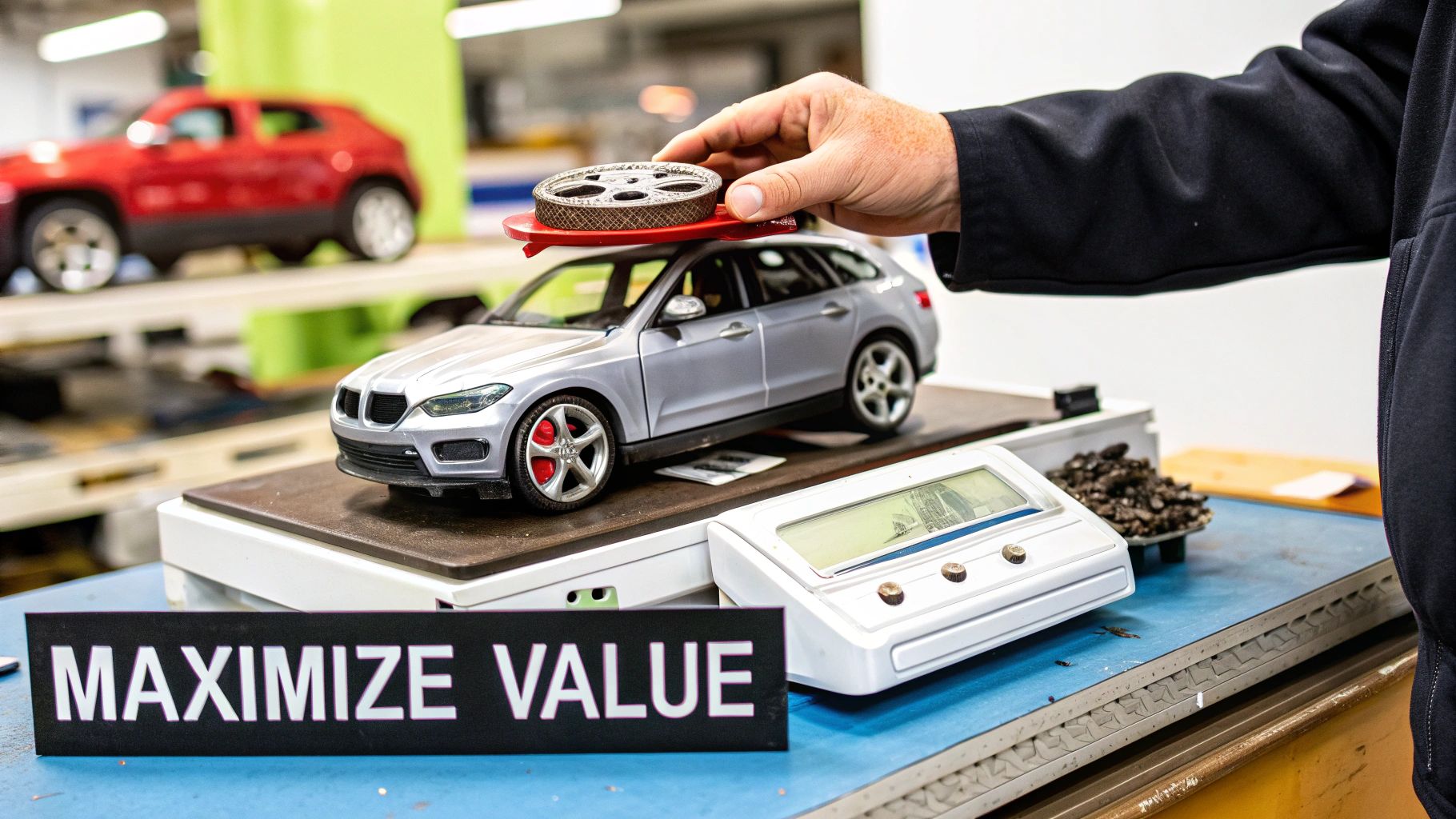
So, you’ve worked out what your car might be worth and you’re thinking about going ahead. At this stage, a few practical questions almost always come up. Getting these final details straight helps make the whole process feel much less daunting. Let’s walk through some of the most common queries we hear from drivers every day.
Paperwork is often the first worry. That’s completely understandable—nobody wants a surprise fine from the DVLA down the line.
Do I Need My V5C Document to Scrap My Car?
Having your V5C logbook makes things easier, but if you’ve misplaced it, don't worry. It’s not a deal-breaker. While it's the simplest way to prove ownership, you can still scrap your car without it.
You’ll just need to prove you're the rightful owner using other documents. A valid photo ID like a passport or driving licence, paired with a recent utility bill showing your current address, is usually enough. You'll then have to let the DVLA know in writing that you’ve scrapped the vehicle, including the date and the details of the scrap dealer.
Can I Get Paid in Cash for My Scrap Car?
No, you can't. It's actually illegal for any scrap metal dealer in the UK to pay you in cash. This law, the Scrap Metal Dealers Act of 2013, was introduced to combat metal theft by making every transaction traceable.
Any legitimate Authorised Treatment Facility (ATF) will pay you by bank transfer or cheque. This creates an official record of the payment, protecting both you and them.
If a company offers you cash for your car, it’s a massive red flag. Our advice? Walk away. Stick with professional services that follow the rules.
Will I Be Charged for Collection?
With most reputable companies, collection should be completely free. The price you're quoted should be the exact amount you receive, with no surprise charges for towing your car away.
It's always smart to confirm this when you get your quote, though. Just ask, "Is collection included in that price?" It’s a simple question that can save you from a nasty shock if a less-than-honest operator tries to knock a 'collection fee' off your payment on the day.
What Happens to My Car After It’s Scrapped?
Once your car is collected, its journey isn't over. It’s taken to a registered Authorised Treatment Facility (ATF), where it undergoes a strict depollution process. All the hazardous fluids—like oil, petrol, and brake fluid—are safely drained. The battery is removed, and any reusable parts are salvaged for resale.
Finally, the remaining metal shell is crushed flat, shredded into small pieces, and sorted. This recycled metal is then ready to be melted down and repurposed into new products.
Ready to see what your car is worth? Fast Scrap Car provides transparent, competitive quotes with free, same-day collection across London and Surrey. Get your instant valuation now at https://fastscrapcar.co.uk.
